| Srl | Item |
| 1 |
ID:
134356
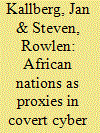

|
|
|
|
|
| Summary/Abstract |
The growth of the African Internet, and services related to the Internet, has been rapid over the last decade. Following this market expansion, a variety of service providers have started to provide access. A fast-growing market puts pressure on the providers to deliver services first and only then seek to secure the networks. Over time, industrialised nations have become more able to detect and trace cyber attacks against their networks. These tracking features are constantly developing and the precision in determining the origin of an attack is increasing. A state-sponsored cyber attacker, such as intelligence agencies and electronic warfare units, will seek to avoid detection, especially when the attacks are politically sensitive intelligence-gathering and intrusion forays into foreign states' networks. One way for the attacker to create a path that links the attacks and the originating country is by actions through a proxy. The less technologically mature developing nations offer an opportunity for cyber aggression due to their lower level of security under the quick expansion of the Internet-based market. Developing countries could be used as proxies, without their knowledge and consent, through the unauthorised usage of these countries' information systems in an attempt to attack a third country by a state-sponsored offensive cyber operation. If the purpose of the cyber attack is to destabilise a targeted society and the attack succeeds, the used proxies are likely to face consequences in their relations with foreign countries, even if the proxy was unaware of the covert activity.
|
|
|
|
|
|
|
|
|
|
|
|
|
|
|
|
| 2 |
ID:
166289
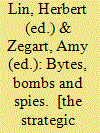

|
|
|
|
|
| Publication |
Washington, D C, Brookings Institution Press, 2018.
|
| Description |
xiii, 424p.pbk
|
| Standard Number |
9780815735472
|
|
|
|
|
|
|
|
|
|
|
|
Copies: C:1/I:1,R:0,Q:0
Circulation
| Accession# | Call# | Current Location | Status | Policy | Location | IssuedTo | DueOn |
| 059656 | 355.0305/LIN 059656 | Main | Issued | General | | RF076 | 17-Jun-2023 |
|
|
|
|
| 3 |
ID:
130365


|
|
|
| 4 |
ID:
121970
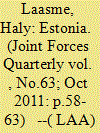

|
|
|
| 5 |
ID:
150181
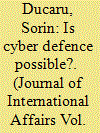

|
|
|
| 6 |
ID:
177756
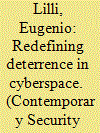

|
|
|
|
|
| Summary/Abstract |
This article explores the nature and the desirability of private sector contribution to national strategies of cyber deterrence. The article starts by developing a variation of the concept of cyber deterrence, called RCDC deterrence, which is simultaneously restrictive, comprehensive, dynamic, and complemental. Second, it applies RCDC deterrence to identify and analyze specific areas of cyber deterrence that can benefit the most from private sector contribution. Third, the article cautions about the potential security, legal, and moral issues that could arise from such private contributions. Instead of offering definitive answers on these complex issues, the article ends by suggesting avenues for further research. The ultimate objective is to assist decision-makers in designing policies and regulations aimed at maximizing the benefits of public–private cooperation in cyber deterrence while mitigating its potential downsides.
|
|
|
|
|
|
|
|
|
|
|
|
|
|
|
|